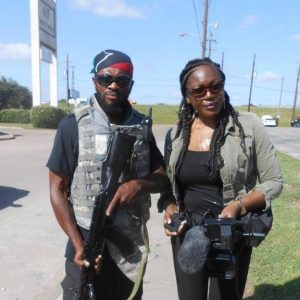
I am a British documentary film maker – born and raised in London. I’ve been working in the UK mainstream film industry for around 15 years.
After leaving university with a Master of Arts in Journalism, my first job was as a Researcher on a documentary for Channel 4’s flagship current affairs series, Dispatches – entitled ‘Gang Wars’. This film was the first to highlight the ‘post code’ wars in the streets of many towns and cities in the U.K., involving groups and gangs of young people. It featured the distressing stories of 2 young girls who died in a drive-by shooting in Birmingham, England – both of them black. In this and other cities in the UK, young victims of knife and gun crime were – and remain – disproportionately from black and ethnic minorities.
I went on to work on other films looking at youth on youth violence and crime: ‘Why Kids Kill’; ‘My Best Friend’s Murder’; ‘Kids, Knives and Broken Lives’ and many more – mainly for Channel 4 and the BBC.
As an Assistant Producer, I made some great films with the BBC, and travelled to Uganda, Congo, South Africa and the USA on research trips, frequently on my own. I was responsible for investigating – and gathering evidence on – subjects as diverse as gay rights to the physical and sexual abuse of children and women in Africa on the grounds that they were witches or possessed by demons. Many of these films involved unique access, which I managed to secure.
After a few years, despite my track record, I began to notice that I did not seem to be getting the same breaks as other people with the same experience. I was ‘stuck’ as an Assistant Producer – and not promoted to Producer or Director. This meant I had to defer to more senior people in the making of these documentaries. I might be responsible for most of the research and content – but I didn’t get the credit. My views counted in the editing process, but I never had the final say.
I also noticed that when it came to films about black people, many of the stories had negative connotations – primarily stories about killings and abusive practices. When I suggested more positive stories, the broadcasters didn’t seem interested.
And even when stories involving the disproportionate killings of black people were commissioned, I noticed that in every instance, the Producers and Directors were white – with just the ‘token’ black person as a camera person, assistant producer or researcher.
I was determined that would change. In 2015 I was both disturbed and concerned at the amount of police killings of unarmed black people in America. It seemed as if every time I looked at social media there was a police shooting. I actually had sleepless nights about it as the images never left my mind. I decided I wanted to make my own film – one that I produced and directed, one that I decided the content of.
So using my own money, I went to Dallas for three weeks – and filmed with Babu, Eric, Yahcanon and others. I did a ‘taster’ and showed it to Channel 4. They were only interested if I was willing to work with, and be guided by a white male director. That didn’t work out. I offered the story to the BBC, pointing out my unprecedented access. They weren’t interested – but later hired a white director to make a film on a similar subject. Later, when I asked why I hadn’t been invited to work on this film, I was questioned: “But can you tell both sides of the story”? I was deeply insulted by this implication that a white director could be fair and objective about the issues, but a black director couldn’t.
It was then that I decided that I would make the film myself – independently, through crowd funding.
So this is the first film that I am solely responsible for Producing and Directing. Please help me.
I know I have the skills and the talent to make a great film. One of the reasons why I carry on – while many black people I know have left the industry – is because I am a ‘fighter’. I never give up. I also want to help pave the way for other black film-makers, by proving that with commitment and determination, we can achieve our dreams.
However long it takes, this film will be made.